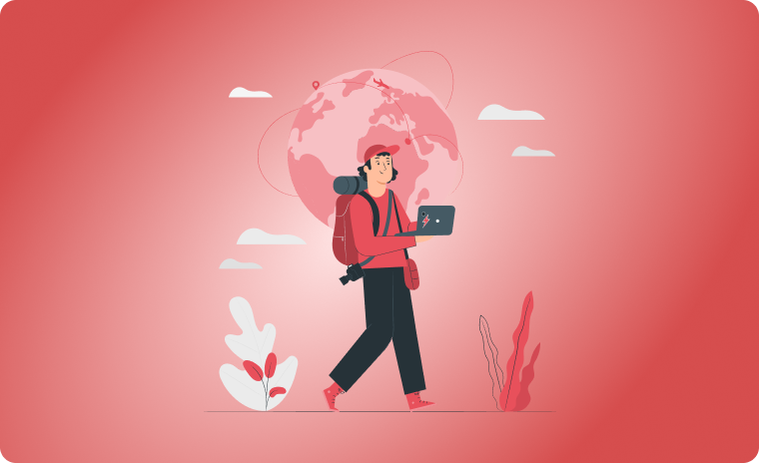Digital Nomadism: Can Work and Travel Coexist?
The workplace will never be the same after the pandemic, that's for sure. According to some reports, office attendance is at around one-third of its pre-pandemic levels in 10 major U.S. cities. This is in line with prior reports stating that almost three-fourths of employees want some sort of flexible work. Americans expect to work from home 25 percent of the time in the next decade. While most people choose between hybrid and remote work, some take it up to 11 and become digital nomads, successfully blending remote work with travel.
A digital nomad is someone who works remotely while traveling to new places. Digital nomads bring together work and travel by taking advantage of the advances in communications technology and the fact that air travel has become more affordable and convenient. These people value experiences over careers. They want to see new places, immerse themselves in new cultures, and meet new people while making a living working remotely.
The inflationary period the U.S. is going through recently fuels the interest in this lifestyle. Seeing that inflation is canceling the salary raise they receive and eating into their earnings, people are looking to relocate to places where the U.S. dollar retains its purchasing power or home currency is hit by inflation even harder than the U.S. dollar was. Digital nomadism can be a fun way of preserving the standard of life one is used to.
The interest in this way of life has reached such an extent that governments are passing new legislation to attract digital nomads. Countries like Estonia, Greece, Thailand, and the United Arab Emirates offer digital nomad visas. Spain takes it up a notch by combining digital nomad visas with a favorable tax code and promoting its small towns and villages as ideal stops for digital nomads. Already one of the favorite destinations for digital nomads, Spain aims to leverage the interest from these people to revitalize its economy while offering them the authentic life experience they are after.
The appeal of digital nomadism is evident. Being able to choose where you will work from, meeting new people, turning boring work into an exciting adventure, setting off once again when another opportunity arises… The whole experience sounds too good to be true. But it's not without its challenges.
-
Freedom without any structure can lose its appeal quickly. Like many other phenomena, boundless, unchallenged freedom loses its meaning. Having the freedom to work from anywhere without the constraints of office life may translate into doing too little with your day. Preserving the work-life balance can prove difficult for some people in the absence of a traditional office. Digital nomads are splitting the difference between vacationers and expats, not having as much fun as the former and not earning as much as the latter. Not putting down roots may make it difficult for a person to work with dedication, which translates into settling for less than you can achieve. It's no wonder that some digital nomads report being disappointed by the experience.
-
Work has a social side to it and suffers immensely when it is reduced to emails and Zoom calls. When you are working remotely, you are denied social contact with your colleagues, which holds you back at your job. People peg you into the "tourist" category and treat you like one.
-
The bureaucratic work involved in travel, renting a place, dealing with legal matters, and the inconsistent internet infrastructure across different countries can create an unnecessary burden on people. Time spent dealing with such issues is time you can neither spend on travel nor work.
With travel restrictions coming to an end after the pandemic, we may expect digital nomadism to become even more popular. The deferred demand for travel will definitely translate into more people ending up in Phuket, Tuscany, or Zanzibar for "work purposes." Bloggers, artists, and authors might have dominated the ranks of digital nomads for years, but the rapid advances in no-code technology and SaaS platforms are telling us that this is about to change. Developers and web designers who led the Great Resignation and the Great Exodus out of Silicon Valley can end up in different corners of the world, knowing full well that they can now run a full-fledged business from thousands of miles away. It takes a bit of self-discipline, no doubt, but it is doable. And you only live once, don't you?




 Please
fill out this field
Please
fill out this field









